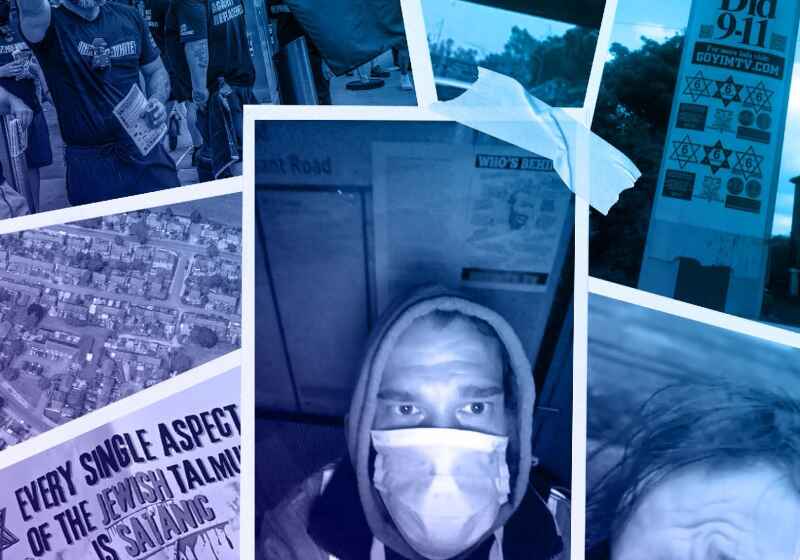CST Blog
The development of far right terrorism in Europe
27 July 2011
The report published by CST today, Terrorist Incidents Against Jewish Communities and Israeli Citizens Abroad, 19682010, includes several successful and foiled terrorist attacks against Jews by neo-Nazis and others on the far right. In the light of the horrific terrorist attack in Norway last week, and the ongoing debate about far right terrorism, we reproduce below the section of the report which gives an overview of the history and development of far right terrorism in Europe.
In the aftermath of the Second World War, the antisemitic ideologies of the far right naturally drew on the example of Nazi Germany, but were modified to accommodate the political realities of the age. Among those who advocated violence against Jews, Francis Parker Yockey was important for defining and promoting a transatlantic and trans-European alliance. His failure to persuade several disparate elements to work together within the European Liberation Front, which he founded in 1949 after breaking away from British far right leader Sir Oswald Mosley, led to his relocation to Egypt, where he worked with former Nazi Major General Otto Ernst Remer, former SS Colonel Otto Skorzeny and Haj Amin Al Husseini, all then living there in exile.
A generation later in the early 1960s, the former Belgian Nazi collaborator, Jean Francois Thiriart, established the Jeune Europe movement with the realisation that the trappings of Nazism had to be abandoned if young people were to be attracted. He also advocated a wider European collaboration, from the Atlantic to the Urals, excluding America. Like Yockey, he urged the militarisation of the white struggle against communism and non-European migration into Europe. As with Povl Riss Kudsen, the contemporary leader of the World Union of National Socialists, he adopted elements of leftist thinking into his evolving ideology, and supported the Palestinian cause against Israel.
During the 1970s, a violent far-right vanguard emerged from the German National Democratic Party (Nationale Democratische Partei), and spawned the Action Front of National Activists (Aktionsfront Nationaler Aktivisten) and later the New Front Group (Gruppe die Neue Front). Their terrorist actions, including an armed assault on a NATO establishment in 1978, led to the imprisonment of leader Michael Kuhnen in 1979, and the suppression of the groups.
Between 1968 and 2004, far-right violence resulted in over 30 terrorist attacks against Jews worldwide. These ranged from Molotov cocktail attacks to the substantial September 2003 plot by the German neo-Nazi Kameradenshaft Süd group. The latter plot involved bombing the opening ceremony of the rebuilt Munich Synagogue, which, had it come to fruition, would have led to the deaths of Jewish community leaders and of the German Federal President Johannes Rau.
Far-right terrorism does not appear on the surface to be planned or coordinated at either a national or international level. Rather, it is often the consequence of a small minority acting out their extreme ideology. However, a 2007 analysis by Europol noted that:
Although violent acts perpetuated by right-wing extremists and terrorists may appear sporadic and situational, right-wing extremist activities are organised and transnational.
The inspiration for many is almost certainly the philosophy of leaderless resistance, as popularised by the American neo-Nazi Louis Beam, and the messages contained in the American novels of National Alliance founder William Pierce, The Turner Diaries and Hunter. The former depicts a violent revolution in the USA that leads to the overthrow of the federal government and the extermination of all Jews and non-whites; the latter describes a campaign of targeted assassinations of couples in inter racial marriages and civil rights activists carried out by a Vietnam War veteran who gets drawn into a white nationalist group planning insurrection.
The Turner Diaries was a formative influence on David Copeland, the London Nail Bomber, a former member of both the British National Party and the more extreme National Socialist Movement, who was imprisoned for life after a bombing campaign in London in 1999, which killed three and injured over 200. The Police investigation into his three bombings, which targeted minority communities in the capital, showed that he also considered bombing a Jewish target.
One trans-European group is the Racial Volunteer Force (RVF), which emerged out of the British Combat 18, with branches in the UK, Germany, Belgium and the Netherlands. It describes itself as an international militant Pro White Organisation, hints at violence and warns potential members to think hard before joining. The Dutch security service identified the Forces members as strongly ideologically developed and capable of playing an important role in furthering and cementing contacts.
Preparing for terrorism is an element in the strategies of all these groups, although it does not necessarily indicate a readiness to act. During April and July 2005, the German authorities confiscated large caches of arms and explosives in raids on neo-Nazis homes, although the security service commented that the intention appeared to have been to possess the arms rather than use them immediately. A 2008 Europol report noted an increasing number of far-right terror plots in the United Kingdom by individuals classified as lone wolves, who share an ideological or philosophical identification with an extremist group, but do not communicate with the group they identify with.
These concerns have since been borne out by a succession of terrorism convictions of British neo-Nazis. These include Ian and Nicky Davison, the founders of the Aryan Strike Force, who manufactured ricin poison and pipe bombs, and were described in court as Nazi zealots who believed in white supremacy and revered Adolf Hitler. They hated minority ethnic groups, be they Black, Asian, Muslim or Jewish It is clear that they wanted to take violent, direct action; Trevor Hannington and Michael Heaton, also Aryan Strike Force members, who were found guilty on terrorism charges and whose website threatened to kill Jews and burn down a synagogue today; and Martin Gilleard, a member of several neo-Nazi groups, who was found guilty of preparing an act of terror, and described in court as actively planning to commit terrorist acts against people and communities he hated, including Jews.
Within Europe at least, the primary targets for far-right terror in recent years have been Muslims rather than Jews. This correlates to a wider change in the agenda of the European far-right, both violent and non-violent, from antisemitism to Islamophobia, although openly neo-Nazi groups still express and promote antisemitism. Muslims are now the primary victims of political agitation by racist groups in Europe. This is partly because they are more easily identifiable targets, and partly because Muslim migration and integration are the focus of mounting public debate across Europe.


